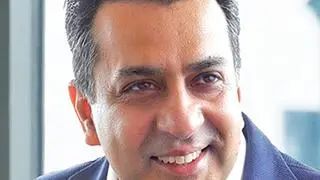With more than a decade and a half in the telecom industry, Sunil Dutt, President-Devices, Reliance Retail, is using all his learning at Nokia, Samsung and BlackBerry to drive Reliance Jio Infocomm’s handset brand LYF. Dutt, who has completed nearly two years with the Reliance Group, says that the focus is on building a brand and value for customers. In a tete-a-tete with BusinessLine, he also quells the myth that India is a cost-sensitive market. Edited excerpts:
You have completed two years with Reliance Jio. What kinds of preparations went into the making of the LYF handsets?
The first and foremost was to identify what the consumers were looking for, and we were trying to guesstimate that for the last two years. We have been trying to estimate consumption patterns, and once that was done, it was about developing the whole eco-system, such as appointing vendors and partners.
India is growing fast in 4G technology, therefore we are being ready with those kinds of devices from day one. Also, parallely, we also built infrastructure in terms of distribution, with about 1,200 distribution partners in devices, who in turn, are servicing about 1,15,000 retail points of sale selling smartphones.
Building the right kind of organisation was the next part for us, and then the entire brand building and other initiatives were another hit.
Then it was about our supply chain system, billing system and technology supporting the ordering system and claim systems. Finally, to support customers we have 1,000 Jio centres, which are manned by about 3,000 service engineers across the country.
Most of the smartphone technology is already there in the market. How much did you have to reinvent?
We had to reinvent some parts of it. For example, when we started off, the market estimate of 4G devices was less than half of what we had estimated it to be. I am happy to say that we had called it correctly. The whole ecosystem changed rapidly.
When launching handsets with high-end technology, will this result in prices going up?
Not really. There are devices priced at ₹4,000 that support 4G across all the three spectrum bands (800, 1800 and 2300 MHz),that support Voice over LTE (VoLTE) and voice over Wi-Fi.
When our chairman had declared at a shareholding meeting that we will bring devices at ₹4,000, I don’t think the world believed it at that point in time, but we made it happen by working with technology, component suppliers and others in the industry. We told them India is a market, and not just LYF as a brand.
There will be several other brands also working towards the same objective. I would say bringing in the latest technology would not correspond to an increase in price.
On the handsets front, has India always been a cost-sensitive market?
That’s a misnomer. India has never been a cost-sensitive market; the country has been a value-driven market. We are willing to pay for value.
All the global brands are successful in India, which is driven mainly by value. Affordability is a real issue for a portion of the population, but we are also value conscious.
A lot of handset manufacturers are bundling services with their products as differentiators. Do we see LYF also coming up with a lot of services?
That’s in the pipeline. I am sure we will mature very soon. Consumers are now looking at a device for the experience, and it’s no longer about voice calls or sending messages. Now, people are looking at services, because they add value.
IDC says you are number five in the pecking order. How did you achieve that?
Honestly, we are not driven by that as a number. The vision is very clear, of being consumer-centric at all points of time; market share is just a derivate.
What is the life expectancy of handsets now, as users change mobile phones every two or three years?
At the top end of the market, people are changing their devices much more rapidly, but this is limited to a very small section of consumers. At lower price points, people don’t change devices so frequently, as they want the maximum value.
Are LYF and Jio treated as two different businesses?
LYF and Jio are two separate businesses; LYF stands on its feet and Jio whenever we launch commercially will be on its own feet. So, it’s not as if one is dependent on the other.
LYF is still a relatively unknown brand in the market. What are your plans to gain mind share?
First is the focus on building the brand. A new TV commercial is in the pipeline. We will be investing in outdoor advertising heavily and will continue to do that. Retail is a focus area, and we are serious about the digital space.








Comments
Comments have to be in English, and in full sentences. They cannot be abusive or personal. Please abide by our community guidelines for posting your comments.
We have migrated to a new commenting platform. If you are already a registered user of TheHindu Businessline and logged in, you may continue to engage with our articles. If you do not have an account please register and login to post comments. Users can access their older comments by logging into their accounts on Vuukle.